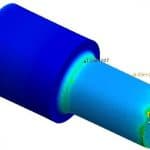
MC 012 Six-Sigma and Materials Engineering

Your Reliability Engineering Professional Development Site
Author of Metals Engineering and Product Reliability articles and Metal Conversations podcast.
This author's archive lists contributions of articles and episodes.
by Michael Pfeifer, Ph.D., P.E. Leave a Comment

by Michael Pfeifer, Ph.D., P.E. Leave a Comment

In this episode, I discuss the state of steel metallurgy knowledge and the things this knowledge has enabled, including ultra-high volume steel production and the ability to engineer components with a wide range of properties for a wide range of applications.
To learn more about this subject, check out the article A Tribute to Steel Metallurgy Knowledge.
by Michael Pfeifer, Ph.D., P.E. Leave a Comment

How do you look at any product? See just a thing that performs a certain function? In this episode I discuss my perspective on how I see a product – as an assembly of materials – and how it influences how I help design products to meet performance, reliability, and cost goals.
by Michael Pfeifer, Ph.D., P.E. Leave a Comment

In this episode I discuss learning and professional development. There’s so much to know to be an engineer and college courses cover the tip of the iceberg, even if you go to grad school. I learned this early in my career as I was faced with decisions and problems related to topics that I never encountered in school. I also learned that I had to shoulder the responsibility of learning the topics. Some of the learning came from colleagues, some came from taking short courses, and some came from reading textbooks and technical journals. In this episode I discuss my learning experiences and philosophy about learning, the pitfalls of relying on learning just from experience, and resources for learning and professional development.
by Michael Pfeifer, Ph.D., P.E. Leave a Comment

In this episode I discuss Design for Manufacturability related to component fabrication and joining components by welding, brazing, or soldering. Design for manufacturing is concerned with designing components and assemblies that can be repeatedly produced with consistent good quality without hassles, and at low-cost. DFM applies to primary component fabrication processes, secondary processing (coating, heat treating), and joining. Primary component fabrication processes include casting, extruding, stamping and other cold forming, forging, and machining. Secondary processes include heat treating, machining, and coating by painting, electroplating, anodizing and other processes. And joining includes welding, brazing, soldering, and using adhesives.
by Michael Pfeifer, Ph.D., P.E. Leave a Comment

In this episode I discuss failure analysis component or joint failures during product testing or use and manufacturing problems such as supplier quality problems and manufacturing output that doesn’t meet specifications.
Failure analysis is part of performing a root cause analysis to identify the action, event, or decision that led to a component failing in a product or led to a manufacturing problem. The information from a root cause analysis is used to either fix a problem – in the case of product design and manufacturing – or assign blame – in the case of an insurance claim or litigation.
by Michael Pfeifer, Ph.D., P.E. Leave a Comment

(Apologies up front – I recorded this episode using the wrong microphone. So, the sound quality is fair. I’ll do better next time.)
There are microscopic structures and processes in metals that have large effects on metal properties, performance, and reliability. Being able to conceptualize these structures and processes goes a long way toward understanding the behavior of metals and the effects of mechanical processing and heat treating on metal properties. In this episode I discuss some of the microscopic structures and their effects on metal properties.
I also discuss recent projects and a bonus at the end – some details about my recent trip to Seward, Alaska
by Michael Pfeifer, Ph.D., P.E. 4 Comments

Fatigue involves localized, permanent damage to metals exposed to cyclic stress. In a previous article I discussed the fatigue mechanism. This article covers factors that can be addressed to improve high-cycle fatigue life
Factors that influence fatigue life
Several design, material, and fabrication factors influence component and joint fatigue life, including the following: [Read more…]
by Michael Pfeifer, Ph.D., P.E. Leave a Comment

In this episode Michael discusses the metals engineering perspective to component design. The concepts actually apply to all materials – metals, polymer, ceramics, and new classes of materials.
No matter the application, the considerations when designing a component are always the same. It’s necessary to understand all the design requirements when selecting materials and finalizing a component’s shape and features. The design requirements include performance, reliability, weight, cost, how the component will be fabricated, and how it will be joined to other components. With this information it’s possible to identify alloys and make changes to the component’s shape and features as needed to meet the design requirements at low-cost. Often, trade-offs between component materials and form are made to optimize the design. This is especially important for design for manufacturability to keep costs down and ensure a receptive supply base.
by Michael Pfeifer, Ph.D., P.E. Leave a Comment

Metals engineering is the application of metallurgy (the science of metals) to design and manufacturing decisions and problems involving metals. In this episode I explain the fundamental principles of metallurgy and how they are applied to engineer metals for component design and solving component failures and production quality problems.
by Michael Pfeifer, Ph.D., P.E. Leave a Comment

In this episode I discuss two lessons I learned as a process engineer in the semiconductor fab. One lesson was a real-life example of the effects of manufacturing processes on metal microstructure and the resulting effects on a metal property that was used to monitor a manufacturing process. The other lesson was about the fallacy of engineering or scientific ingenuity.
by Michael Pfeifer, Ph.D., P.E. Leave a Comment

In a previous article I discussed the degradation of materials due to exposure to stressors (use conditions) and how to identify stressors. Cracks form and grow in axles and shafts due to cyclic stress, steel screws corrode when exposed to water, some plastics become brittle when exposed to sunlight, and coatings on surfaces can wear away. When too much degradation occurs, components and joints fail, leading to product failure.
If you’re someone who likes to design reliable products, you must think about the stressors and their effects. When designing a product, we must identify the following things [Read more…]
by Michael Pfeifer, Ph.D., P.E. Leave a Comment

I discuss my education, my experience working in a semiconductor factory and as part of a product design group, and the many different product design and manufacturing activities I was involved in as a metals engineer.
by Michael Pfeifer, Ph.D., P.E. Leave a Comment

This episode is an introduction to the Metal Conversations podcast. Michael Pfeifer from Industrial Metallurgists, LLC introduces himself and gives a brief description of what the podcast series will be about.
Michael Pfeifer is a metallurgist and metals engineer. He works with design and manufacturing clients to help with component materials selection, manufacturing process development, supplier evaluation, failure analysis and root cause analysis.
He received a B.S. and M.S. in Metallurgical Engineering from University of Illinois and a Ph.D. in Materials Science and Engineering from Northwestern University. He is a Professional Engineer, licensed in Illinois.
He’s wrote a book – Materials Enabled Designs. It teaches how to select materials that optimize product performance, reliability, and cost.
For more information about Michael go to https://www.imetllc.com/about/
Industrial Metallurgists offer metallurgy and metals engineering consulting and training. The training is geared to design, manufacturing, and quality engineers. More information about Industrial Metallurgists’ services and training is at https://www.imetllc.com/
by Michael Pfeifer, Ph.D., P.E. Leave a Comment

Any product is a collection of materials that have been engineered, shaped, and modified to become components and joints (e.g., weld and braze joints). The materials can degrade due to exposure to use conditions – steel screws corrode when exposed to water, some plastics become brittle when exposed to sunlight, and coatings on surfaces can wear away.
Components and joints will stop functioning as required if their materials degrade too much. This is a problem if it reduces or loses product performance before the end of a product’s expected life.
Identifying the conditions to which materials are exposed and selecting materials that can withstand the exposure are critical parts of designing products that have good reliability.
During this event, I will discuss identifying the conditions that can cause materials to degrade. [Read more…]